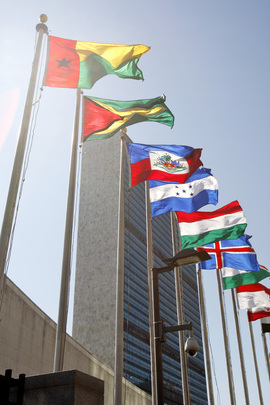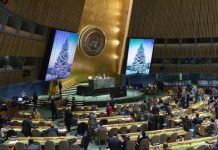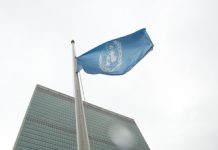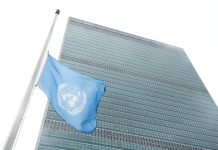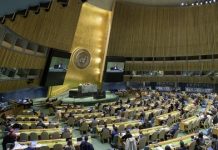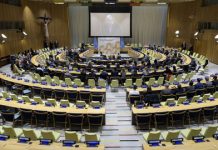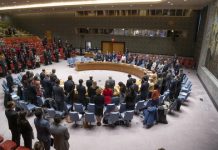Intensified Israeli airstrikes on 23 September forced nearly 120,000 people to flee their homes within a week, according to UNHCR.
As of 20 October, that number has spiked to 809,000 displaced within Lebanon. A further 425,000 – of whom around 70 per cent are Syrian refugees and about 30 per cent Lebanese – are estimated to have crossed from Lebanon to Syria, as of 21 October.
Latest reports indicate that the rate of new arrivals across the Syrian border remains steady but has decreased compared to the initial phase of the influx.
“In addition to the tragic loss of life and massive displacement, Lebanese and Syrians are experiencing a fundamental destabilization of families and communities, compounding the previous multiple crises,” UNHCR said in an emergency update.
It highlighted the need for a significant scaling up of sustained international support for both Lebanon and Syria to cope with the challenges and deliver emergency, lifesaving aid.
Widening ‘evacuation’ orders
About a quarter of Lebanon’s total territory remains under Israeli military evacuation orders, with fresh displacement notice designating a large area within the city of Tyre in southern Lebanon, inside the area of operations of the UN Interim Force in Lebanon (UNIFIL).
Tyre was then subsequently hit by numerous airstrikes.
Reportedly founded by the Phoenicians in 2750 BC, the city is considered to be “directly associated with several stages in the history of humanity” according to the UN Educational, Scientific and Cultural Organization (UNESCO).
Bomb damage following airstrikes on Beirut’s southern suburbs.
Fighting continues unabated
Meanwhile, active hostilities continue between Israel Defense Forces (IDF) and Hezbollah across the “Blue Line’” of separation in southern Lebanon.
On Tuesday, UNIFIL detected 1,028 trajectories of projectiles across the frontier, the majority originating from south of the Blue Line, targeting areas including Al Qawzah, Aytarun, Markaba, Tallusah, Ett Taibe, El Khiam, Kfar Kela, UN Deputy Spokesperson Farhan Haq told journalists at the regular news briefing in New York.
Just over 80 projectiles were recorded from north of the Blue Line, he added, noting also that UNIFIL continued to record a high level of violations of Lebanese airspace.
Click below to listen to a UN News interview with Tess Ingram from the UN Children’s Fund (UNICEF) on the impact of the crisis on children.
Rights expert condemns attack on bank
Also on Wednesday, an independent human rights expert expressed deep concern over Israel’s bombing of a financial institution with links to Hezbollah in Lebanon, stating that it violated international humanitarian law by targeting civilian infrastructure.
“International humanitarian law does not permit attacks on the economic or financial infrastructure of an adversary, even if they indirectly sustain its military activities,” said Ben Saul, the Special Rapporteur on human rights while countering terrorism.
Israel had warned publicly that it would attack offices associated with a specific financial institution, which Israel says finances the Hezbollah organization.
Mr. Saul reiterated that in armed conflict, only “military objectives” can be attacked, defined as objects that effectively contribute to military action and whose destruction “offers a definite military advantage.”
Unlike fighters or weapons, the mere economic activities of an adversary do not effectively contribute to military action, the Geneva-based Human Rights Council-appointed Special Rapporteur added.
Special Rapporteurs serve in their individual capacity, independent of the United Nations. They are not UN staff members and do not draw a salary.
UNIFIL peacekeepers patrol along the Blue Line. (file)
Peacekeepers under fire
Concern also continues for the safety and operations of UN peacekeepers in Lebanon with the UNIFIL mission, who patrol the Blue Line and support Lebanese civilians in need.
“The Mission reports that the ongoing hostilities in its area of operations are continuing to affect the safety and security of peacekeepers and their ability to implement UNIFIL’s mandate,” Mr. Haq said.
Tuesday evening (local time), UNIFIL observed the impacts of airstrikes near its headquarters and the Greenhill area close to Al Naquora, causing some damage.
After midnight two UNIFIL vehicles engaged in a medical evacuation encountered a roadblock during their operation near Yarin, Mr. Haq said.
The convoy was then subject to small arms fire, resulting in damage to one of the vehicles which had to be left at the location. The team managed to safely extricate themselves from the scene without any casualties.
“We again remind the parties of their obligations to ensure the safety and security of UN personnel and to respect the inviolability of UN premises at all times,” Mr. Haq stated.
“UN peacekeepers continue to remain in their positions despite the very challenging situation.”
Source of original article: United Nations (news.un.org). Photo credit: UN. The content of this article does not necessarily reflect the views or opinion of Global Diaspora News (www.globaldiasporanews.com).
To submit your press release: (https://www.globaldiasporanews.com/pr).
To advertise on Global Diaspora News: (www.globaldiasporanews.com/ads).
Sign up to Global Diaspora News newsletter (https://www.globaldiasporanews.com/newsletter/) to start receiving updates and opportunities directly in your email inbox for free.


